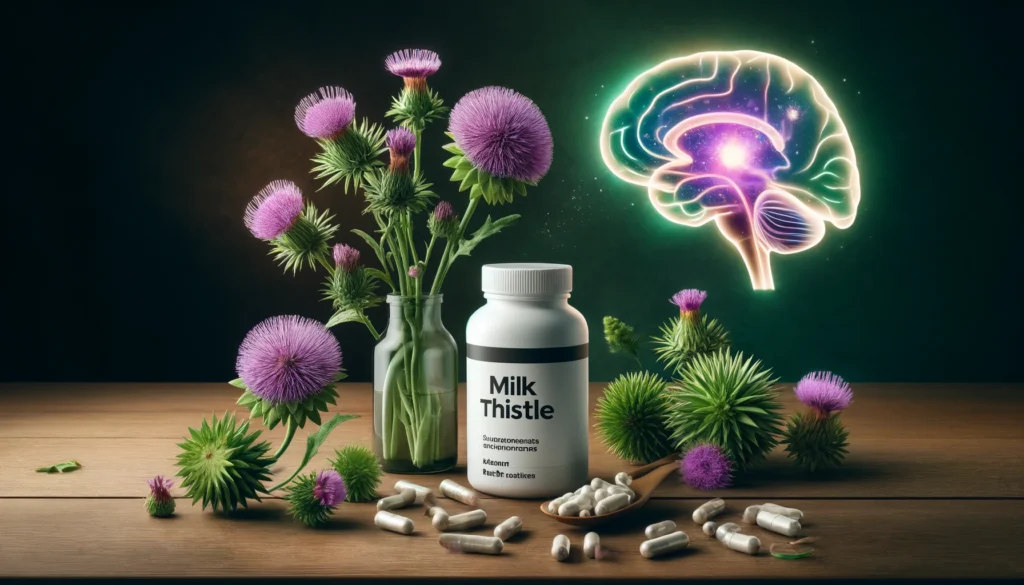Milk thistle (Silybum marianum), a flowering plant native to the Mediterranean region, has long been heralded for its liver-protective properties. However, more recently, interest in its potential nootropic benefits has grown. The active ingredient in milk thistle, silymarin, is a complex mixture of flavonolignans, with silibinin being the most prominent and studied component. Known primarily for its hepatoprotective effects, silymarin has been shown to provide a range of physiological benefits, particularly regarding liver health.
In addition to these effects, recent research suggests that milk thistle may offer potential cognitive enhancement, making it an increasingly popular choice among those interested in nootropics. This article explores the chemistry, physiological mechanisms, and potential cognitive benefits of milk thistle, as well as providing important information on safe dosage, side effects, and interactions with other drugs and supplements.
You May Also Like:
Sources of Milk Thistle
Milk thistle is derived from the seeds of the plant Silybum marianum, which contains high concentrations of silymarin. Silymarin is composed of several flavonoids, including silibinin, silydianin, and silychristin. These active compounds are responsible for most of the herb’s medicinal properties, particularly its antioxidant, anti-inflammatory, and hepatoprotective effects.
While milk thistle can be consumed in various forms, such as tea, capsules, or tinctures, the most potent form is a standardized extract that contains a high concentration of silymarin. These extracts are widely available as dietary supplements and are used to support liver function, detoxification, and, more recently, to promote cognitive health.

Chemistry of Milk Thistle
Milk thistle’s medicinal effects are primarily attributed to its active ingredient, silymarin. Silymarin is a flavonoid complex made up of flavonolignans, with silibinin (also known as silybin) being the most well-researched and bioactive component. Chemically, silibinin consists of two dihydroflavonol units, which are bound together by a central bond and a hydroxyl group. This structure is essential for its biological activity.
- Silibinin: The most active compound in silymarin, silibinin, is responsible for the majority of the herb’s therapeutic properties, including its antioxidant and hepatoprotective effects. Silibinin’s structure allows it to bind to cell membranes, enhancing cell stability and protecting against oxidative stress.
- Silychristin and Silydianin: These components also contribute to the therapeutic properties of milk thistle, though they are less studied compared to silibinin. They possess similar antioxidant and anti-inflammatory properties, but their concentrations in milk thistle preparations are typically lower.
The pharmacokinetics of silymarin are important when considering its effectiveness. Silymarin is poorly absorbed in its native form, but liposomal formulations or phospholipid complexes can enhance its bioavailability, making it more effective for therapeutic purposes.
Physiological Mechanism of Action of Milk Thistle on the Body and Brain
The physiological effects of milk thistle and its active compound, silymarin, are vast and varied. These effects are largely due to the bioavailability and potency of its active flavonoids, especially silibinin.
1. Liver Protection and Detoxification
Milk thistle’s most well-known function is its ability to support liver health. Silymarin, through its constituent compounds, plays a crucial role in antioxidant defense, particularly in the liver. It scavenges harmful free radicals and reduces oxidative stress, a process that is especially important for liver detoxification. The liver is a central organ for detoxifying the body, and oxidative damage to liver cells can impair these functions. Silibinin, a major active component of silymarin, enhances glutathione levels in the liver, a key antioxidant that helps detoxify harmful substances. Additionally, silibinin promotes the regeneration of liver cells, which is important for healing from liver damage caused by toxins, alcohol, or disease.
2. Neuroprotection and Cognitive Function
In terms of nootropic effects, milk thistle’s antioxidant properties also extend to the brain. The blood-brain barrier (BBB) is a selective permeability barrier that protects the brain from harmful substances, but it also limits the entry of beneficial compounds. Recent studies suggest that certain components of silymarin, particularly silibinin, have the ability to cross the BBB and exert neuroprotective effects.
By reducing oxidative stress and inflammation, milk thistle may help protect neurons from damage associated with neurodegenerative diseases, such as Alzheimer’s disease and Parkinson’s disease. This neuroprotection is thought to occur through free radical scavenging, reduction of neuroinflammation, and enhancement of mitochondrial function. These actions help prevent neuronal damage, improve synaptic plasticity, and support overall cognitive function. As a result, milk thistle is increasingly being explored for its potential as a cognitive enhancer and neuroprotectant.
3. Cognitive Enhancement through Neurotransmitter Regulation
Silymarin has also been shown to modulate neurotransmitter activity, particularly that of dopamine and serotonin, two neurotransmitters crucial for mood regulation, learning, and memory. Research indicates that milk thistle may influence the dopaminergic system, which is involved in motivation, focus, and reward, thereby possibly enhancing cognitive performance and mood. By improving neurotransmitter synthesis and reducing oxidative damage in brain cells, milk thistle may help support brain function in the context of mental clarity, focus, and memory.

Potential Nootropic Benefits of Milk Thistle
Milk thistle’s potential as a nootropic (cognitive enhancer) is gaining increasing attention due to its various neuroprotective properties. Below are the primary nootropic benefits associated with milk thistle supplementation:
1. Neuroprotection and Prevention of Cognitive Decline
As mentioned, one of the most promising cognitive benefits of milk thistle lies in its ability to reduce oxidative stress and neuroinflammation. Chronic oxidative stress and neuroinflammation are thought to contribute significantly to age-related cognitive decline and neurodegenerative diseases, such as Alzheimer’s and Parkinson’s. By protecting brain cells from this damage, milk thistle may help slow cognitive aging and promote long-term brain health.
While studies specifically investigating memory and focus are still in early stages, the modulation of neurotransmitter systems—particularly dopamine and serotonin—suggests that milk thistle may improve mental clarity and focus. Both dopamine and serotonin are integral in processes related to attention, memory retention, and emotional regulation. By modulating these neurotransmitter systems, milk thistle may improve cognitive function and enhance mental sharpness.
By influencing serotonin and dopamine levels, milk thistle may also help improve mood and reduce symptoms of depression or anxiety. Its ability to combat oxidative stress in the brain, combined with its role in neurotransmitter regulation, may help stabilize mood and promote emotional well-being.
4. Reduction of Brain Toxins
Milk thistle’s active compound, silymarin, is known for its detoxifying effects, particularly in the liver. Emerging research suggests it may also play a role in reducing brain toxins and amyloid plaque formation, which are linked to cognitive decline and neurodegenerative diseases. This detoxification effect may further protect the brain and promote overall cognitive health.

Dosage Guidelines for Milk Thistle
Milk thistle is generally considered safe when taken at appropriate dosages, but its effective dosage can vary based on the individual’s health condition, the form of supplementation, and the concentration of active ingredients in the product.
- Typical Dosage Range: Most studies investigating the benefits of milk thistle use dosages between 200 mg to 400 mg of silymarin per day. These doses are often split into two or three doses throughout the day to improve absorption.
- Standardized Extracts: It is important to note that milk thistle supplements are often standardized to contain 70-80% silymarin, which enhances their potency and bioavailability.
- Liver Health: For liver support, dosages typically range between 200-400 mg of silymarin, taken 2-3 times per day.
As with any supplement, it is important to start with a lower dose to assess tolerance and gradually increase as needed, always under the guidance of a healthcare provider.
Side Effects of Milk Thistle
Milk thistle is generally well-tolerated, but like all supplements, it can cause side effects in some individuals. The most commonly reported side effects include:
- Gastrointestinal Disturbances: Some people may experience mild digestive issues such as bloating, diarrhea, or an upset stomach when taking milk thistle.
- Allergic Reactions: Rarely, individuals may have allergic reactions to milk thistle, particularly those allergic to other plants in the Asteraceae family (such as ragweed, daisies, or marigolds).
- Hormonal Effects: Since milk thistle can influence estrogen receptors, individuals with hormone-sensitive conditions, such as breast cancer, should exercise caution and consult their doctor before using it.

Drug and Supplement Interactions
Milk thistle can interact with certain medications and supplements, so it is essential to consider potential risks:
- Cytochrome P450 Enzyme System: Silymarin can affect the cytochrome P450 liver enzyme system, which is responsible for metabolizing many drugs. It may alter the effectiveness of certain medications, including statins, benzodiazepines, and antidepressants.
- Blood Thinners: Since milk thistle may influence liver function and the metabolism of certain medications, individuals on blood thinners (e.g., warfarin) should consult their healthcare provider before taking milk thistle.
- Diabetic Medications: Milk thistle has been shown to reduce blood sugar levels, which may interact with diabetes medications and require adjustment of dosages.
Safety Considerations for Individuals with Specific Health Conditions
Milk thistle is generally safe, but individuals with certain conditions should exercise caution:
- Liver Disease: While milk thistle is commonly used to support liver health, those with liver disease should consult their doctor to ensure it will not interfere with other treatments.
- Hormonal Disorders: As milk thistle may affect hormone levels, particularly estrogen, those with hormone-sensitive conditions should seek medical advice before using it.
Conclusion
Milk thistle, primarily through its active compound silymarin, offers significant health benefits, especially for liver health and cognitive function. Its antioxidant, anti-inflammatory, and neuroprotective properties make it a valuable supplement for promoting long-term brain health and protecting against cognitive decline. While its nootropic potential remains an area of ongoing research, early evidence suggests that milk thistle could improve focus, memory, and mood. As with any supplement, it is crucial to follow appropriate dosage guidelines, be aware of potential side effects, and consider any drug interactions or health conditions before starting supplementation. By doing so, milk thistle can be a safe and effective addition to a holistic approach to cognitive enhancement and overall well-being.

References:
- Milk Thistle: Effects on Liver Disease and Cirrhosis and Clinical Adverse Effects: Summary. Retrieved from: https://www.ncbi.nlm.nih.gov/books/NBK11896/
- Milk thistle in liver diseases: past, present, future. Retrieved from: https://pubmed.ncbi.nlm.nih.gov/20564545/
- 7 Science-Based Benefits of Milk Thistle. Retrieved from: https://www.healthline.com/nutrition/milk-thistle-benefits
- Milk Thistle Benefits and Side Effects. Retrieved from: https://www.baptisthealth.com/blog/family-health/milk-thistle-benefits-and-side-effects
- A Mini Review on the Chemistry and Neuroprotective Effects of Silymarin. Retrieved from: https://pubmed.ncbi.nlm.nih.gov/28025940/
Important Note: The information contained in this article is for general informational purposes only, and should not be construed as health or medical advice, nor is it intended to diagnose, prevent, treat, or cure any disease or health condition. Before embarking on any diet, fitness regimen, or program of nutritional supplementation, it is advisable to consult your healthcare professional in order to determine its safety and probable efficacy in terms of your individual state of health.
Regarding Nutritional Supplements Or Other Non-Prescription Health Products: If any nutritional supplements or other non-prescription health products are mentioned in the foregoing article, any claims or statements made about them have not been evaluated by the U.S. Food and Drug Administration, and such nutritional supplements or other health products are not intended to diagnose, treat, cure, or prevent any disease.


